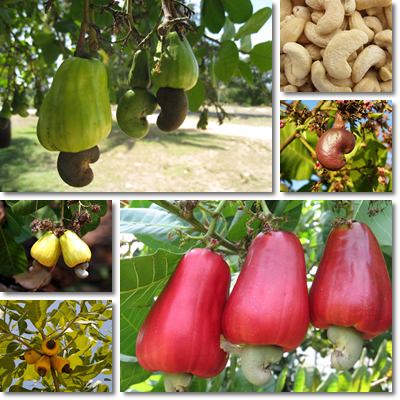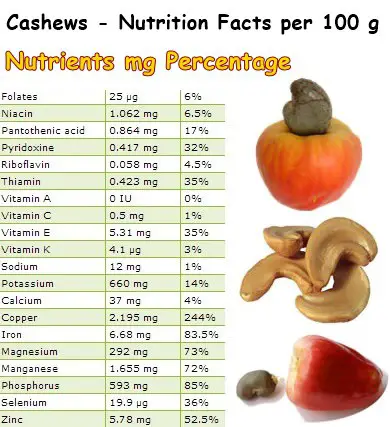The cashew nut is the seed of the cashew fruit called cashew apple. This sweet, pear-shaped, red or yellow tropical fruit makes a savory dessert, while the kidney-shaped nut is a nutritious and popular snack in countries worldwide. Cashews are incredibly rich in minerals such as copper, iron, magnesium, phosphorus and zinc and provide a wide range of health benefits. Eating them on a regular basis, provided you are not allergic to nuts, can supply the body with excellent amounts of nutrients and antioxidants required to keep in good physical and mental health.
Nuts in general also contribute to maintaining a slim figure and youthful appearance due to their generous vitamin, mineral and antioxidant content. Eating only a handful of cashews or 1 tablespoon of cashew butter 3-4 times a week has been shown to significantly reduce the risk of coronary heart disease, provided, of course, we enjoy an overall healthy, varied and balanced diet that meets our individual nutritional demands.

What do cashews look and taste like?
Cashews (Anacardium occidentale), also known as ‘caju’, are an interesting combination of a savory nut and a sweet, tropical fruit. A pseudo-nut, the cashew nut, is attached at the bottom of a beautiful yellow or red pear-like or bell-pepper shaped pseudo-fruit with an incredibly sweet smell and unique aroma. The nut itself has a kidney shape. When shelled, it has a beautiful creamy color and a creamy, nutty taste with a slightly sweet aftertaste. What else should you know about cashews?
Cashew nut shells
The shell of the cashew nut contains a resin called anacardic acid. This resin is a potent irritant and toxin, also found in poison ivy, which can cause severe allergic reactions, powerful lung irritations and even death. For this reason, cashew nuts are sold shelled, to avoid exposure to this toxin. Although not many people are allergic to cashews, if you notice any signs of an allergic reaction after consuming the nut, such as a skin rash, difficulty breathing with symptoms such as wheezing, hoarseness or laryngospasms, swelling of the lips, tongue or throat, lightheadedness, low blood pressure, seek medical care at once.
Cashew apple
The cashew fruit, called a ‘cashew apple’, can spoil easily. For this reason it is only available in tropical regions, in the proximity of cashew plantations. While the nut can be consumed raw, baked, roasted or made into a savory paste, the sweet taste of the fruit makes it the best choice for a mouth-watering dessert or even a refreshing tropical drink.

Health benefits of cashew nuts
Unlike other nut varieties, cashews have a much lower fat content than most nuts: 43.85 g of fat/100 g of raw nuts. In addition to this, they are 75% unsaturated fatty acids such as oleic acid. Unsaturated fatty acids support brain activity and promote cardiovascular health by reducing LDL (bad) cholesterol levels and exerting a mild blood pressure-lowering effect.
Moreover, in addition to being good for high blood pressure because of its slight hypotensive effect, the oleic acid in cashew nuts exhibits significant antioxidant activity and prevents the oxidation of lipids, further contributing to blood vessel health and recommending cashews for both high cholesterol and hypertension. However, it’s good to keep in mind that too much fat of any kind is not beneficial for cardiovascular or other aspects of our health, so eating caju with moderation is important.
The human brain is predominantly made of fat and polyunsaturated fatty acids, also found in cashews, maintain the integrity of the grey matter and promote cognitive health. Some studies have also linked diets rich in unsaturated fatty acids with lower breast cancer and cardiovascular disease risks and good cognitive development of fetuses during pregnancy.

Other significant health benefits of cashew nuts derive from their high copper content (approximately 244% of RDI, recommended daily intake for an average adult). A copper deficiency may lead to anemia, broken blood vessels, osteoporosis, rheumatoid arthritis, high LDL cholesterol levels, low HDL cholesterol and so on. This makes it imperative that we have a generous dietary supply of copper.
Aside from good amounts of B vitamins, which support energy metabolism and contribute to higher energy levels, cashews boast an excellent magnesium content. Magnesium (73% of recommended daily intake) increases calcium absorption in bones and supports muscle activity, including that of the heart. Magnesium in cashews further holds benefits for blood sugar control in non-diabetics and type 2 diabetics alike.
Iron (83.5% of RDI) prevents anemia caused by iron-deficiency, supports the immune function and helps us feel more energetic by increasing the amount of oxygen transported to tissues, resulting in increased vitality. Zinc (52.5% of RDI) strengthens the immune system, while selenium (36%) regulates thyroid hormone production, reducing the risk for hypothyroidism, or an underactive thyroid.
Cashews provide all of these health benefits, and more. Eating a handful once every few days can prove extremely beneficial for your health. Cashew and most other nut varieties are a great snack for children as well. The healthy fatty acids found in them will ensure proper cognitive development whilst the variety of vitamins and minerals will result in good energy levels and prevent deficiencies.
Health benefits of cashew apple
The cashew apple does not enjoy much popularity among nutritionists and health enthusiasts mainly because it’s not food people are fond of. An interesting fact: despite its name suggesting otherwise, botanically, the cashew apple is not a real fruit. Even so, preliminary research has given us an insight into its curative properties. The cashew apple boasts a rather impressive antibacterial and anti-fungal activity. It would appear it can prevent dental cavities and is believed to make a great natural remedy against diarrhea.
